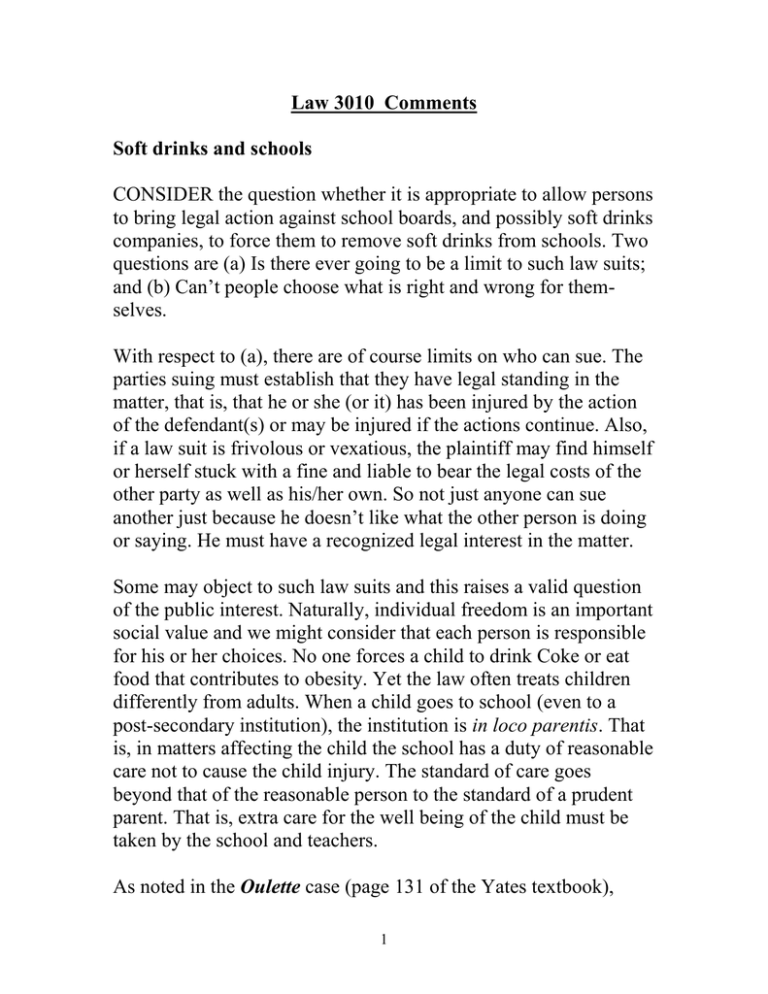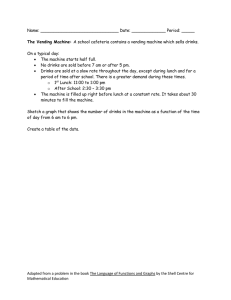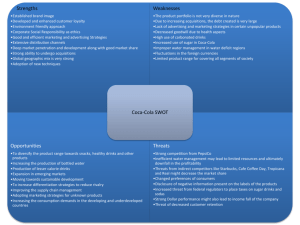Law 3010 Comments Soft drinks and schools
advertisement

Law 3010 Comments Soft drinks and schools CONSIDER the question whether it is appropriate to allow persons to bring legal action against school boards, and possibly soft drinks companies, to force them to remove soft drinks from schools. Two questions are (a) Is there ever going to be a limit to such law suits; and (b) Can’t people choose what is right and wrong for themselves. With respect to (a), there are of course limits on who can sue. The parties suing must establish that they have legal standing in the matter, that is, that he or she (or it) has been injured by the action of the defendant(s) or may be injured if the actions continue. Also, if a law suit is frivolous or vexatious, the plaintiff may find himself or herself stuck with a fine and liable to bear the legal costs of the other party as well as his/her own. So not just anyone can sue another just because he doesn’t like what the other person is doing or saying. He must have a recognized legal interest in the matter. Some may object to such law suits and this raises a valid question of the public interest. Naturally, individual freedom is an important social value and we might consider that each person is responsible for his or her choices. No one forces a child to drink Coke or eat food that contributes to obesity. Yet the law often treats children differently from adults. When a child goes to school (even to a post-secondary institution), the institution is in loco parentis. That is, in matters affecting the child the school has a duty of reasonable care not to cause the child injury. The standard of care goes beyond that of the reasonable person to the standard of a prudent parent. That is, extra care for the well being of the child must be taken by the school and teachers. As noted in the Oulette case (page 131 of the Yates textbook), 1 even an occupier of premises must foresee consequences of a child’s conduct or action that the occupier would not have to foresee with respect to an adult. Children are viewed as more vulnerable than adults to harm caused by the acts or omissions of others. So what about soft drinks sold in schools? Is there evidence that such drinks contribute to obesity? If so, is obesity harmful to children while they are children or in adulthood? Does a school owe a duty of care to a child not to cause the child harm by its act or omission with respect to the availability of soft drinks in the school? Is there a reasonably foreseeable risk that some children may become obese because of the easy access to such drinks and the apparent tacit approval of the school? If there is such a foreseeable risk, and some reasonable steps that the school can take to prevent or alleviate the risk, is there an “Anns” argument that, as a matter of public policy, the school owes no duty of care to the children in such matters as access to allegedly harmful soft drinks? If there is a duty of care on the part of schools with respect to children in such circumstances, is there a risk of harm to some children arising from easy access to such soft drinks? If so, how likely is it that the risk will materialize and how serious may the consequences be if the risk does materialize? If there is a risk of harm, is there anything the school can reasonably do to diminish the risk of harm to the child? If yes, is such action too onerous for the school in light of the measure of the risk? If it were too onerous the school would not have to take action to avoid the risk. If there is a risk to the children that outweighs the burden placed on the school, can a causal link be established between the school’s act of permitting (and arguably promoting) soft drinks in the school and consequential damage to the children? 2 If the plaintiff (for example an obese child) could establish these arguments, what would be an appropriate remedy? Damages for harm caused by the obesity? An injunction imposed by the court requiring the school to remove the potentially harmful soft drinks? Could a law suit be brought against a school board by a public health authority (as in the case of tobacco) for costs incurred due to the health problems created by obesity caused (at least in part) by access to high sugar soft drinks? Could the schools prevent liability by putting a disclaimer beside the machines? Would Coke or Pepsi enter such a deal if the school had such a disclaimer? With regard to the question of people choosing right and wrong for themselves, clearly we want to avoid having decisions imposed on us by others. Yet, most of our decisions are based on knowledge, information and advice that we receive from others. As far as soft drinks are concerned, we receive very little information from manufacturers, retailers, schools, universities, restaurants as to the contents and the health risks of consuming them. They are enormously high in sugar content but we are never told this other than in some article buried in a newspaper we never read. The information gap can sometimes be bridged by a law suit – such as with tobacco- where evidence can be brought in by experts is made vividly available to the public by the media. Sometimes interested parties can join in with the law suit by having amicus curiae status (the right to testify but not receive any remedy from the court) and advancing evidence through experts or individual witnesses harmed in some way. It is not clear to me that a law suit would be successful but the threat of it might cause education boards in the USA and Canada to consider negotiating settlements out of court, such as keeping soft drinks out of elementary schools, posting health warnings in other 3 schools and lobbying governments for sufficient funding that they don’t need to build the basketball court on the funds donated by the soft drinks company. Do you have any thoughts on these matters? If so, let me have them (as part of class participation) and I will post them on the website (anonymously if you prefer). 4


